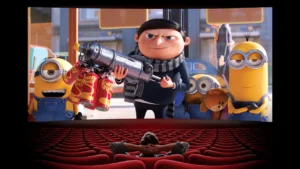Are movie names italicized? It’s a question that often arises when delving into the intricacies of formatting in writing. Whether you’re crafting an essay, a blog post, or a screenplay analysis, the presentation of movie titles can be a point of uncertainty.
In this article, we’ll navigate the conventions and guidelines surrounding the italicization of movie names, shedding light on when and why it’s employed in the world of writing and communication. Let’s embark on this typographic journey to unveil the nuances of formatting movie titles. Are movie names italicized? Let’s find out.
Formatting Guidelines for Movie Titles

Formatting guidelines for movie titles can vary depending on the style guide or publishing platform. However, here are some general rules that are commonly followed:
- Italicization: Most style guides recommend italicizing the titles of movies. This includes both the title of the movie itself and any subtitles it may have.Example: The Lord of the Rings: The Fellowship of the Ring
- Capitalization: Capitalize the principal words in the title. This includes nouns, pronouns, verbs, adjectives, and adverbs. Articles, conjunctions, and prepositions are usually not capitalized unless they are the first or last word in the title.Example: Pirates of the Caribbean: The Curse of the Black Pearl
- Quotation Marks: Some style guides, particularly those in journalistic contexts, may recommend using quotation marks instead of italics for movie titles. In this case, the same capitalization rules apply.Example: “Pirates of the Caribbean: The Curse of the Black Pearl”
- Punctuation: Follow the punctuation used in the official title. If the title includes a colon or any other punctuation mark, retain it in your writing.Example: Harry Potter and the Prisoner of Azkaban
- Articles at the Beginning of Titles: Articles like “a,” “an,” and “the” at the beginning of movie titles are typically not capitalized unless they are the first word in the title.Example: The Dark Knight
- Numerals: If the movie title includes numerals, they are usually written as numerals rather than spelled out.Example: Apollo 13
Remember to consult the specific style guide you’re following for any variations or exceptions to these guidelines. Additionally, consistency is key within a document or publication. Once you choose a style, stick to it throughout your writing.
Are movie names italicized?
Yes, it’s common practice to italicize movie titles when writing them in formal or professional contexts, such as essays, articles, or reviews. This helps to distinguish the title from the surrounding text and follows a convention for emphasizing titles of larger creative works.
However, in less formal contexts like social media posts or informal writing, it’s also acceptable to simply capitalize the movie title without italicizing it. If you’re unsure, it’s always a good idea to check the specific style guide or editorial standards of the publication you’re writing for.
When to Use Italics?

Italics are typically used for several purposes in writing:
- Emphasis: Italics can be used to emphasize a particular word or phrase within a sentence. This is common in informal writing or creative writing when you want to draw attention to a specific point.Example: The cat jumped onto the table.
- Titles of Larger Works: Italics are used to denote the titles of larger works such as books, movies, plays, albums, and TV shows.Example: The Great Gatsby is a classic novel by F. Scott Fitzgerald.
- Foreign Words and Phrases: When using words or phrases from another language, especially if they are not commonly understood by the audience, it’s common to italicize them.Example: The Italian phrase buona sera means “good evening” in English.
- Scientific Names: In academic or scientific writing, italicize genus and species names when referring to organisms.Example: Homo sapiens is the scientific name for human beings.
- Letters and Words as Words: If discussing a specific letter of the alphabet or using a word as a word itself (rather than for its meaning), it can be italicized.Example: The word “example” contains the letter e.
- Thoughts or Internal Dialogue: In fiction writing, italics are often used to represent a character’s thoughts or internal dialogue.Example: I wonder what she meant by that, he thought.
Remember, while italics can be useful for emphasis or clarity, it’s important not to overuse them, as this can make text harder to read. Always consider the context and purpose of your writing when deciding whether to use italics.
Mistakes to avoid with movie names
When referring to movie titles, there are a few common mistakes to avoid to ensure clarity and accuracy:
- Misspelling: Be sure to spell the movie title correctly. Check the title against a reliable source if you’re unsure.
- Misquoting: Avoid misquoting movie titles, including omitting parts of the title or changing it altogether.
- Incorrect Italics or Quotation Marks: Use italics or quotation marks appropriately according to the style guide you’re following. Consistency is key within a document or publication.
- Using Abbreviations Unnecessarily: While abbreviations might be common in casual conversation, it’s generally best to use the full title of the movie in formal writing.
- Confusing Titles with Similar Names: Some movies have similar titles, especially if they are part of a series or franchise. Make sure you’re referring to the correct movie to avoid confusion.
- Ignoring Official Titles: Stick to the official title of the movie, even if it’s long or includes punctuation. Avoid changing or shortening the title unless necessary for brevity and clarity, and always use the title as it appears in promotional materials or official listings.
By avoiding these mistakes, you can accurately and effectively reference movie titles in your writing.
Conclusion
This page answers the question on are movie names italicized. Movie names are often italicized in formal writing to distinguish them from the surrounding text and adhere to conventional style guidelines.
This practice aids in clarity and consistency, ensuring that movie titles are easily recognizable within written works. Whether discussing classics like Casablanca or contemporary blockbusters such as Inception, italicizing movie names helps maintain professionalism and accuracy in writing.



